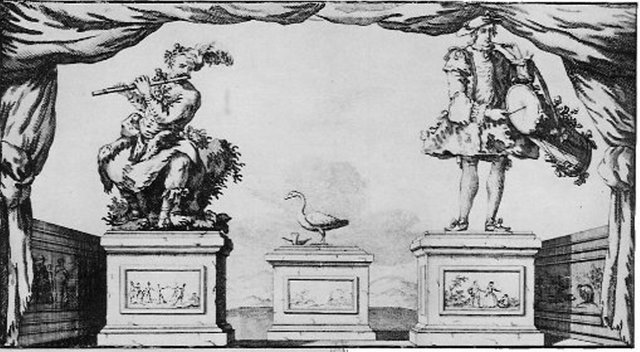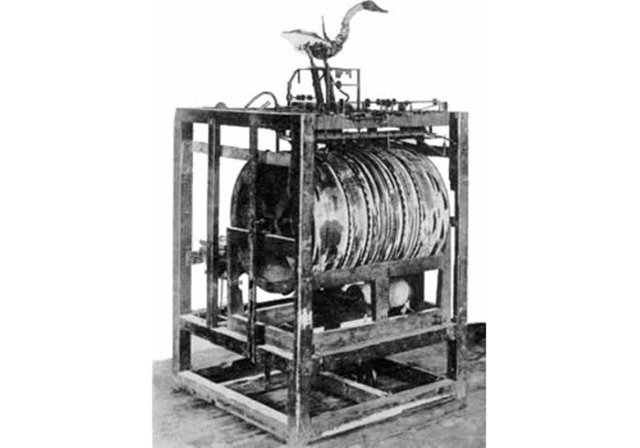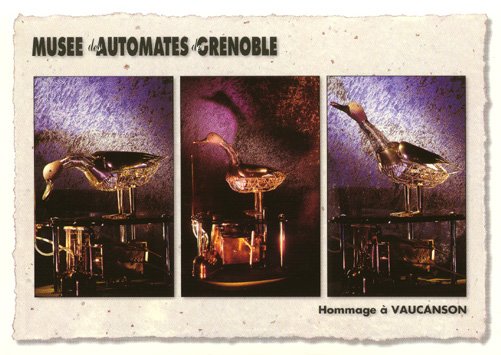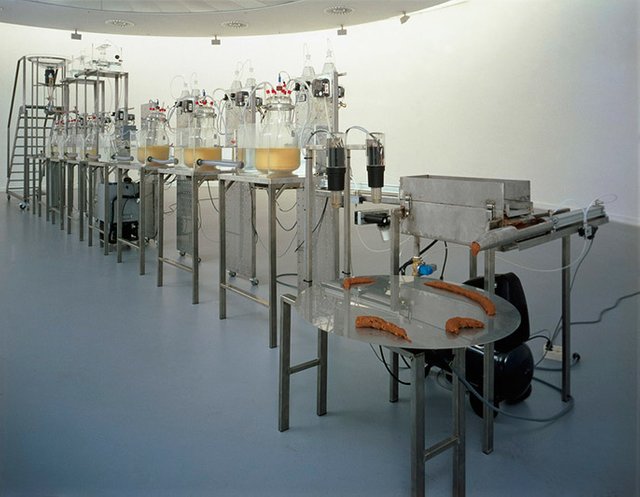Mechanical moving parts can imitate life, and give the impression that the mechanical device is alive as well. Autonomous mechanical movements express the relationship between mechanics and life by imitating human or other animal movements.
Automatons are what these imitations of life are called. Androids are the automata that mimic humans. In the 18th century, the question of how much of life is mechanical in nature was in many minds, including inventors like clockmakers. Can machines represent life more than simple movements? Can machines replicate internal processes as well? Is there a soul?
One of the first automatons was called The Digesting Duck, a simulation of a duck that was purported to digest food. Jacques de Vaucanson made this device that captivated many minds at the time. He was a glove maker, and was involved with the church who didn't like his mechanical contraptions that imitated life. After leaving the religious order, he went to Paris and got into the idea that life was mechanical.
Learning more about anatomy from the surgeon Claude-Nicolas Le Cat, he continued to develop greater machines. Along with the Digesting Duck, two other famous contraptions he made were The Flute Player and The Tambourine Player.

Source
The Digesting Duck was the more complex of the three since it was believed to be able to digest food somehow. Food pellets were offered, and the mechanical duck would dip its head, consume the pellets, and then produce exrements a short while later.
The automatons lost Vaucanson's interest, and he moved onto designing an automated loom. Automation of this kind was not welcome. The only thing the loom needed was something to power the movement, which could be a man, or a donkey for instance. Workers in the silk industry revolted against this new machine that was going to take their jobs, causing Vaucanson to flee disguised as a monk. Even hundreds of years ago, machines were being invented that threated the economic survivability of the people at the time.
All three of the automata have disappeared in history. Johann Goethe, in 1805, saw the duck in private hands along with the two other disabled music playing automata. The duck was in shambles as well, with no feathers, standing like a skeleton, eating oat pellets but not being able to digest any longer, it seemed.

Source
The illusionist and automata maker Robert-Houdin was commissioned to repair a wing, and found that the poop was merely a green-dyed bread pellet hidden in a secret compartment. The "magic" of the duck automaton was just a mechanical slight-of-hand.
The duck and other automata had since been destroyed in a fire that engulfed the Krakow museum in 1879.
In our modern times, automata are so rare at auctions, that they can fetch into the millions.
Despite the original Digesting Duck being lost, in 1999 an atuomaton maker named Frédéric Vidoni recreated the famous mechanical duck, which is now on display at the Musée des Automates, in Grenoble, France.

Source
Check out the new Digesting Duck below:
Also, a mechanical digestive system was developed in 2001 by Wim Delvoye, called the Cloaca. At the end of the processing of food, it produces poop:

Source
Thank you for your time and attention! I appreciate the knowledge reaching more people. Take care. Peace.
References:
- Watches, Automatons, 'Soul,' And The Digesting Duck Of Jacques de Vaucanson
- Canard Digérateur de Vaucanson (Vaucanson's Digesting Duck)
- on Jacques de Vaucanson and his Duck
If you appreciate and value the content, please consider:
Upvoting  , Sharing
, Sharing  or Reblogging
or Reblogging  below.
below.
Looking to contact me? Find me on Discord or send me a message on SteemKURE.
Please consider supporting me as a Steem Witness by voting for me at the bottom of the Witness page; or just click on the upvote button if I am in the top 50:

If you are unsure how to vote for witnesses, you can put my name in the "SET PROXY" section at the bottom of the Witness Voting page which will use my witness votes.
2017-03-25, 1:08pm

Everything we know about how living things operate shows that they are machines. Machines that can build themselves. I also think that in the not too distant future there will be 'autonomous' artificial life, whose process of creation and renewal develops its own little culture and knowledgebase and interacts with us.
People worry about these machines taking over our lives but who wants to do the dirty anyway, if a machine can do it without complaints?
Furthermore, artificial life forms will require technology that will also allow us to augment ourselves - we won't let ourselves get behind them, we will of course always try to be at the tip of the spear.
I think as the technology develops we will start to learn just how much exactly we are not in control of anything (even self-control is a program that we will develop out of primarily experience at 'not' being restrained). People are afraid of coming face to face with the fact that we have this beautiful illusion of free will and freedom but really, we are not free, but neither is the King our master...
Downvoting a post can decrease pending rewards and make it less visible. Common reasons:
Submit
I think people worry too much about artificially intelligent robots gaining power and taking over the world. I think, in the near term at least, that we should worry more about AI making rich people richer and the poor and middle class poorer.
All of this concentrating of power into a very few elite has to be bad. The question is "What can we do about it."
Downvoting a post can decrease pending rewards and make it less visible. Common reasons:
Submit
How do they do that??? I wish I could mimic being alive and well! Great article...something to think about and a testimony to the tenacity of man. It shows that people won't give up on this until somebody gets it right.
Downvoting a post can decrease pending rewards and make it less visible. Common reasons:
Submit
The Digesting Duck is an incredible story, I had no idea. Thanks for sharing @krnel. It's a whole lot of effort for a little bit of crap. Ha!
Downvoting a post can decrease pending rewards and make it less visible. Common reasons:
Submit
Hehe, fake crap!
Downvoting a post can decrease pending rewards and make it less visible. Common reasons:
Submit
So, the technology has really progressed at breakneck speed. Today MSM can produce fake crap practically instantly and in unlimited quantities :)
Downvoting a post can decrease pending rewards and make it less visible. Common reasons:
Submit
lol, true dat!
Downvoting a post can decrease pending rewards and make it less visible. Common reasons:
Submit
It is interesting to see how autonomous systems/technology developed for last decade, quite rapid...digesting part was a surprise/mystery for me though :)
Downvoting a post can decrease pending rewards and make it less visible. Common reasons:
Submit
Greetings, @krnel! Good and clear. Thank you!
Downvoting a post can decrease pending rewards and make it less visible. Common reasons:
Submit
Do you know anything more about the poop created by the mechanical digestive system? Does it actually smell like poop? Also, is there any real application for this technology?
Downvoting a post can decrease pending rewards and make it less visible. Common reasons:
Submit